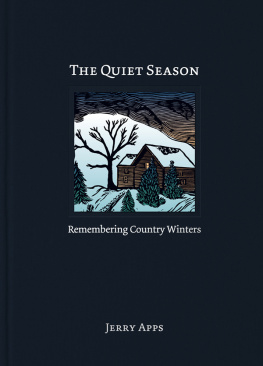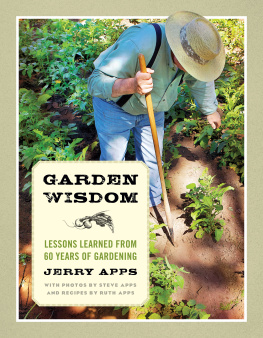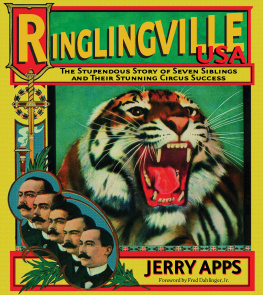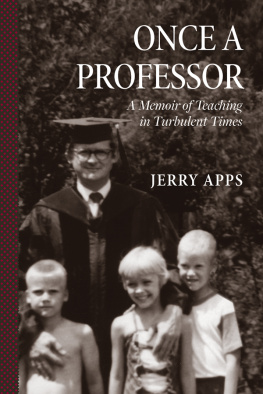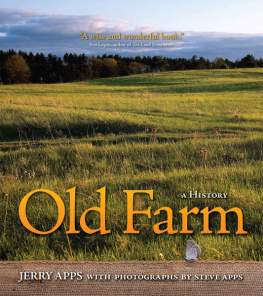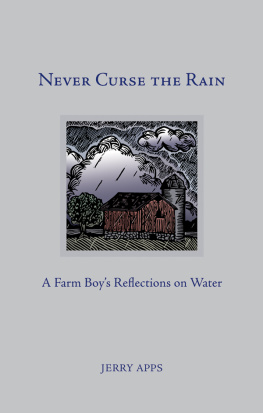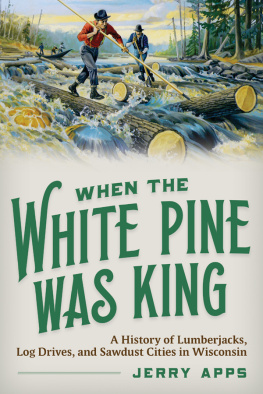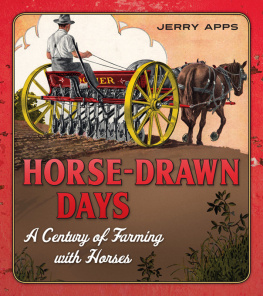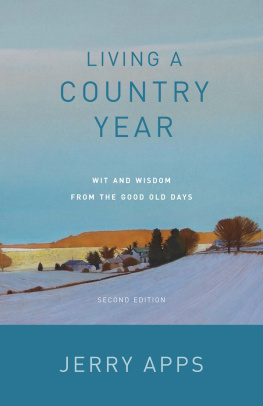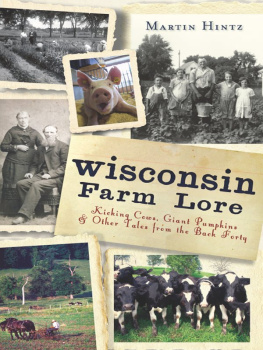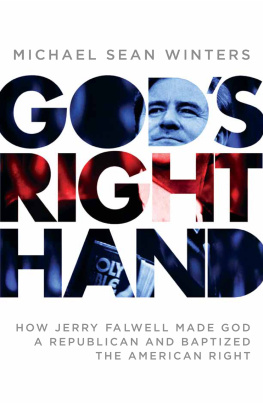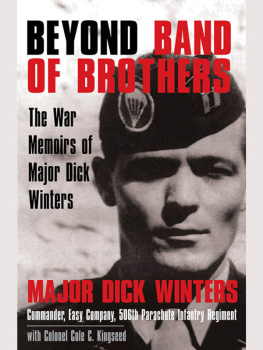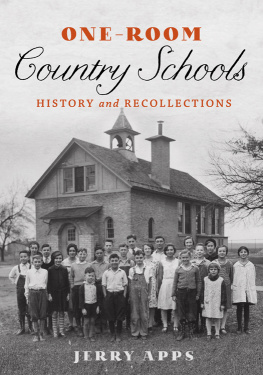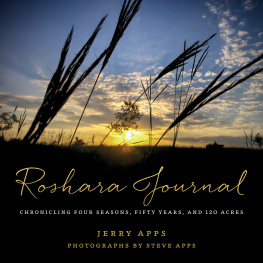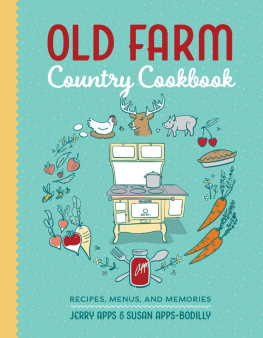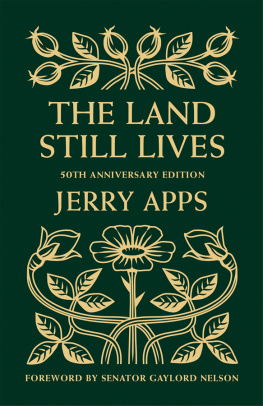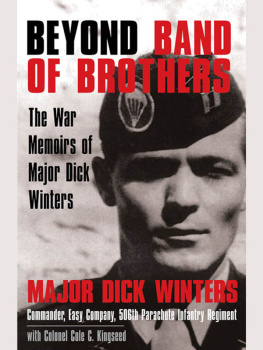As I think back to the days of my childhood, the frost-covered windows in my bedroom, the frigid walks to the country school, the excitement of a blizzard, and a hundred other memories, I realize that these experiences left an indelible mark on me and made me who I am today.
The Quiet Season: Remembering Country Winters
A companion to the
Wisconsin Public Television documentary
A FARM WINTER WITH JERRY APPS |
THE QUIET SEASON
Remembering Country Winters

Jerry Apps
WISCONSIN HISTORICAL SOCIETY PRESS
Published by the Wisconsin Historical Society Press
Publishers since 1855
2013 Jerold W. Apps
E-book edition 2013
Publication of this book was made possible in part by a grant from the Amy Louise Hunter fellowship fund.
For permission to reuse material from The Quiet Season (ISBN 978-087020-607-8, e-book ISBN 978-0-87020-608-5), please access www.copyright.com or contact the Copyright Clearance Center, Inc. (CCC), 222 Rosewood Drive, Danvers, MA 01923, 978-750-8400. CCC is a not-for-profit organization that provides licenses and registration for a variety of users.
wisconsin history .org
Cover illustration by John Zimm 2013
17 16 15 14 13 1 2 3 4 5
The Library of Congress has cataloged the printed edition as follows:
Apps, Jerold W., 1934
The quiet season : remembering country winters / Jerry Apps.
pages cm
ISBN 978-0-87020-607-8 (hardcover : alkaline paper) 1. Apps, Jerold W., 1934Childhood and youth. 2. Apps, Jerold W., 1934Family. 3. WinterWisconsinHistory20th century. 4. Farm lifeWisconsinHistory20th century. 5. WisconsinSocial life and customs20th century. 6. Rural familiesWisconsinHistory20th century. 7. WisconsinRural conditions. I. Title.
F586.A65 2013
977.5'043dc23
2013002122
Winter has a concentrated and nutty kernel if you know where to look for it.
HENRY DAVID THOREAU
journal entry, November 28, 1858

To my brothers, Donald and Darrel, who
experienced many of these stories with me,
and who have known not quite
as many winters as I have.
INTRODUCTION
I was born in the midst of the Great Depression and grew up on a central Wisconsin farm, where the winters were fierce and seemingly never ending. I have never left the North, and outside of the time I spent in the army I have never missed a winter in Wisconsin.
Over the years I have come to appreciate and even enjoy northern winters. But Ive also learned that there is more to winter than snow and ice and bitter cold. Winter has shaped me in ways that go deeper than I am even aware. I believe this is true for everyone who has spent any length of time in the North. Living through a real wintera northern winteraffects how we think, influences what we believe is important, and causes us to relate to other people in a particular way.
For farm families like mine, winter meant slowing down. The rest of the year on the farm was near nonstop activity: plowing, stone picking, and planting in spring; cultivating, hoeing, making hay, threshing, and picking cucumbers in summer; silo filling and corn husking in fall. Through it all we also built fence, repaired machinery, tended our animals, and of course milked the cows twice a day. In winter we took a well-earned rest in preparation for the busy seasons to come. The short days and long, dark nights forced us to follow the rhythms of the natural world and reminded us that we were in fact part of naturenot as different from the plants and animals as we might have thought.
Theres a resilience that comes with having a few northern Januaries under your belt. Winter on the farm was difficult at best, even dangerous when a blizzard roared in from the northwest and closed us off from the outside world, sometimes for several days. But we never worried about power outages, since we had no outside power; electrical lines would not arrive at our farm until 1947. Our kerosene lamps lit the long evenings, and our wood-burning stoves kept us warm enough. We had no indoor plumbing, either, so we used a gasoline-powered engine to pump water for the farm animals and for our own use. (We also kept our trips to the frigidly cold outhouse as brief as possible.)
Along with a hard-won self-reliance, I credit winter with teaching me the value of patience. It just takes longer to accomplish things in winter. We wallowed through several feet of snow to our woodlot to cut wood for hungry woodstoves, a task slowed considerably by cold weather and deep snow. When snowstorms plugged our road with snowdrifts and stopped all travel past our farm, there was nothing we could do about it except wait for the snowplow, which always cameeventually.
The importance of family came into sharper focus during winter. Although we attended school no matter the weather (our country school never closed), some blizzards kept us from traveling into town for weeks. While those storms made our farmwork all the more challengingpaths had to be cleared from building to building, sometimes several times in one day, and our heavy winter clothing made it that much harder to get our work donethey were also cause for our family to draw closer together. When the weather was especially snowy or bitterly cold, we gathered in the kitchen or the dining room (the only rooms in our farmhouse heated by woodstoves) and played Monopoly, checkers, or card games like Flinch and Smear. My twin brothers and I built things with Tinker Toys and Lincoln Logs and read books that we had brought home from our school library. While we sat at the dining room table to do our homework around the kerosene lantern, our parents joined us, Pa at one end reading the Milwaukee Sentinel or the Wisconsin Agriculturist, Ma at the other darning socks, mending worn overalls, or working on other sewing projects.
While winter forced us to turn our attention to home and family, it also instilled in us a strong sense of community. In those days farm families relied on each other for all sorts of help, from barn raisings to midwifery. And it was never more important than during winter that we look out for our neighbors, making sure that they were warm and had plenty to eat. Getting caught outside in a blizzard or in below-freezing temperatures can be deadly. Rural people know this very well and tend to keep track of each other during extreme weather.
Besides depending on neighbors for their help with such winter tasks as butchering and sawing wood, we brightened the long winter nights with neighborhood card parties and the occasional dance, sometimes in a neighbors home, more often at our country school. We celebrated weddings, birthdays, and anniversaries together and likewise came together to mourn the death of a community member. Casseroles, cakes, and pies appeared at the grieving familys home, and everyone attended the funeral, no matter what their religion or whether they were religious at all. Neighbors quickly and quietly showed up to help with the milking and other farm chores during these sad times.
Perhaps most profoundly for me, winter embeds in us northerners a deep respect for the natural world. Natures power is formidable, never more so than in winter. Theres nothing like a blinding blizzard to remind us humans that we are not in charge, even though we sometimes fool ourselves into thinking we are.
Each fresh snowfall provided a canvas for recording recent happenings on the landscape. By learning to identify animal tracks in the snow, a skill I acquired from my father, I could see where a squirrel had dug for acorns, where a deer had pawed for something to eat, where a fox had walked during the previous night. One time I followed a fox trail until I found where it intersected with rabbit tracks. A bit farther along I discovered where the rabbit had met its fate, nothing left but a few drops of blood on the white snow and a few tufts of rabbit fur. The fox track continued on. There on the snow I saw life and death in their simplest terms, a vivid reminder of the natural order of things. My interest in nature and its deeper meaning in our lives has stayed with me since those early experiences. On the snow-swept fields of our farm, I learned a profound lesson about nature as teacher.
Next page
